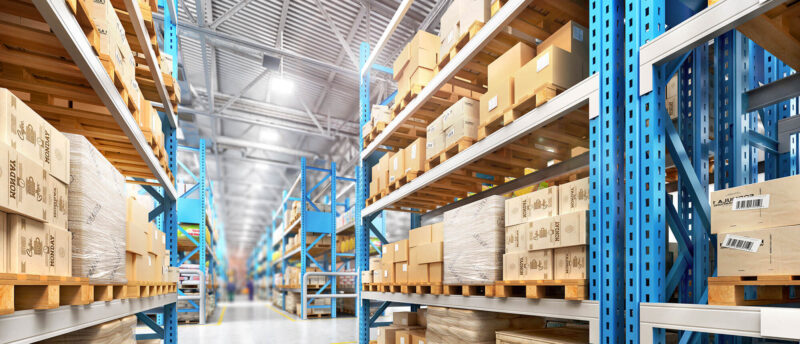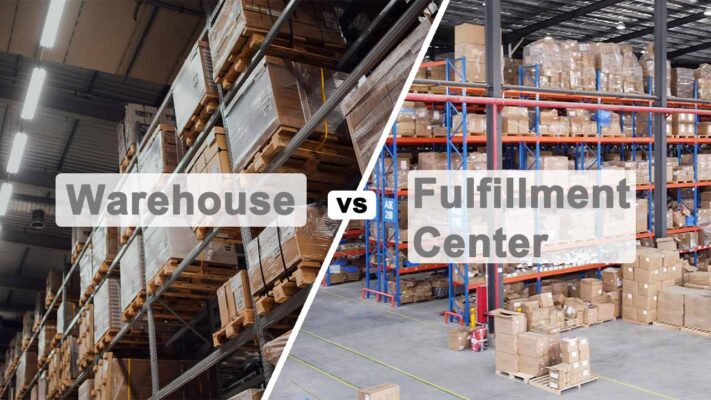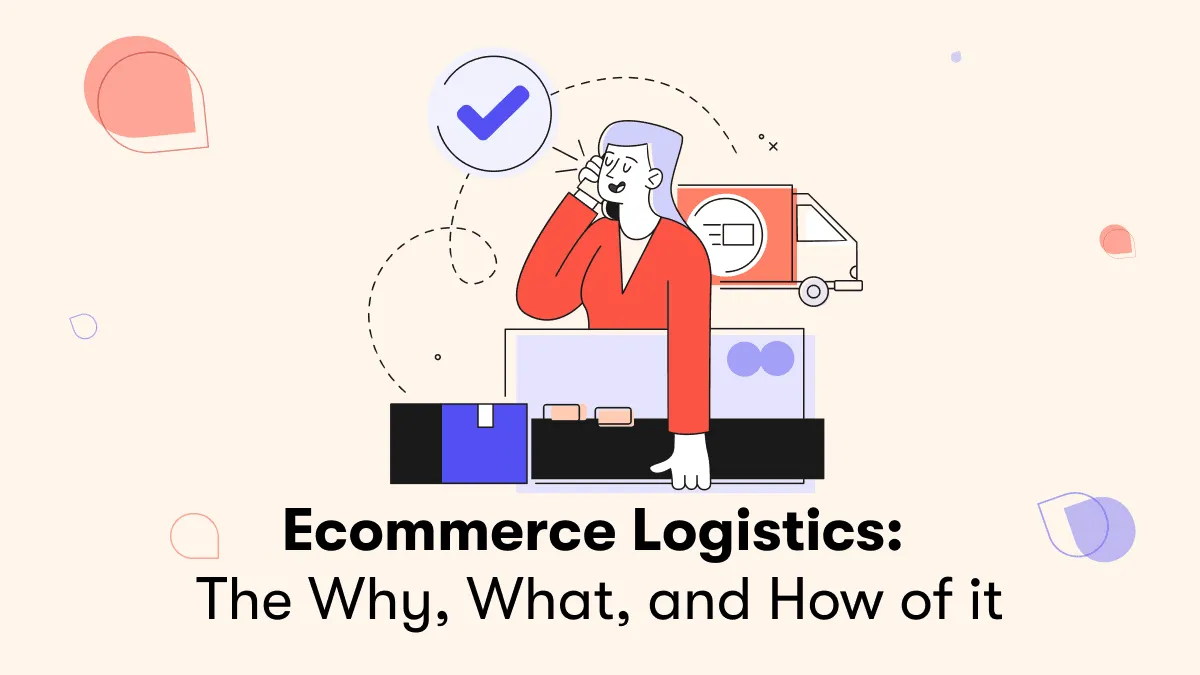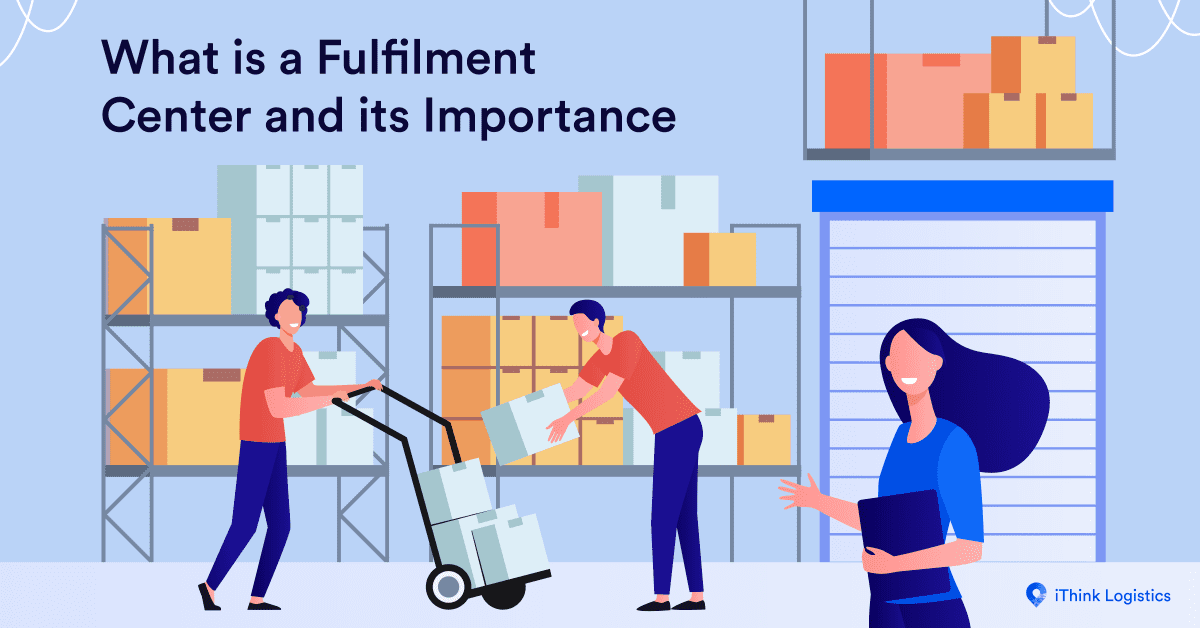What Does a Fulfillment Center Do & How Do They Compare to Warehousing Services?
The terms “warehouse” and “fulfillment center” (or “distribution center“) are often used interchangeably – but in reality, the two have very different connotations.
While both are large buildings that hold inventory for businesses that sell goods, they each have their own unique use cases, and serve different purposes for ecommerce brands.
In this article, we’ll define and break down the definitions and benefits of fulfillment centers and warehouses, as well as the key differences between the two so you have a better idea of which option is best for your business needs.
What does a warehousing solution do?
A warehouse is a large storage center or industrial space designed to house inventory in bulk. A warehousing solution refers to a company that stores products on a business’s behalf within their warehouses for an extended period of time.
Warehouses can be dedicated to storing only certain types of inventory. For example, some warehousing providers geared toward wholesale business may only store inventory dedicated to B2B ecommerce orders.
When it comes to acquiring warehouse space, brands have two options: buy (or build) their own, or lease warehouse space from an outside warehousing provider. Larger brands or retailers with lots of resources may be able to afford their own warehouse; for small businesses, leasing warehouse space is typically more cost-effective – especially if they partner with a warehousing partner and rent space in a warehouse in conjunction with other ecommerce businesses.
What is a fulfillment center?
A fulfillment center is a part of the supply chain and serves as the hub for all logistics processes needed to get a product from the seller to the customer. It houses all of the activities involved in the order fulfillment process, ranging from order picking and processing to packaging and shipping.
As with warehousing, ecommerce brands have two options when it comes to finding a fulfillment center: either operate their own, or partner with a third-party logistics (3PL) provider, such as ShipBob, that operates their own facility (or facilities).

How do fulfillment centers work?
In a fulfillment center, an ecommerce business’s inventory is received and briefly stored in preparation for fulfilling customer orders. After a shopper completes a purchase on the business’s ecommerce store, that inventory is picked, packed in a box or poly mailer, and labeled for shipment. Last-mile carriers then pick up labeled packages from the fulfillment center, and transport them to the end customer.
Fulfillment centers can process both business-to-business (B2B) orders — typically a high volume of product that is sent to a big-box retailer — as well as direct-to-consumer (DTC) orders, which are shipped directly to an individual consumer’s home.
When a seller outsources ecommerce fulfillment, the fulfillment provider is completing the fulfillment process on the store owner’s behalf. This includes everything from inventory management to negotiating rates with shipping carriers.
Outsourcing order fulfillment processes to a fulfillment professional can make it easier to manage inventory, improve customer service, and save the seller lots of time to focus on more strategic tasks.
What is a fulfillment warehouse?
A fulfillment warehouse is another term for “fulfillment center”. A stand-alone warehouse differs drastically from a fulfillment warehouse, as a warehouse is usually a place where inventory is just stored, while a fulfillment warehouse serves many other purposes and houses many other activities besides inventory storage.
What are the differences between warehousing and fulfillment centers?

Let’s take a deeper look at a few of the nuances that distinguish fulfillment centers from warehouses.
Long-term storage vs. short-term storage
While there is a warehousing component to fulfillment centers — in that it does store a merchant’s inventory — the main goal of a fulfillment center is to turn inventory over quickly.
Ideally, inventory should not sit in a fulfillment center for more than a month, or the merchant may be stuck paying high inventory holding costs. Sellers should only store enough inventory in their fulfillment centers to make sure there is always enough product on hand to meet demand.
Conversely, the role of a warehouse or an on-demand warehousing solution is to store products for long periods of time.
Operations
Warehouses are generally static, with the main activity being receiving inventory or transferring it out.
Fulfillment centers, on the other hand, are hubs of activity, full of continuous movement and much more complex operations. A fulfillment partner provides a variety of order fulfillment services in a fulfillment center, including:
- Receiving, checking, and stowing inventory
- Generating pick lists and picking products
- Kitting and assembling shipments
- Packing boxes
- Labeling shipments
- Shipping orders
- Managing returns
Frequency of pickups by shipping carriers
A fulfillment company can have relationships with many different shipping carriers. Since a fulfillment center’s goal is to fulfill direct-to-consumer orders as soon as they are placed, they need shipping carriers to pick up shipments at least daily. This ensures orders will be delivered to consumers on time as promised.
Depending on the exact services a fulfillment company offers, shipping carriers may need to pick up customer orders at certain times each day for guaranteed same-day or next-day shipping options chosen by customers. Other carriers and services will have regularly scheduled pickups, for both domestic and international shipments.
Retail fulfillment companies will have cutoff times by which orders must be placed to be fulfilled that same day. For example, ShipBob offers same-day fulfillment for DTC orders imported into the ShipBob dashboard by the time of the outbound fulfillment SLA (ranging from noon to 6pm local time of the fulfillment center fulfilling it, depending on the location).
Conversely, a warehouse will typically need scheduled, less frequent pickups, since it is more cost-effective to ship freight and have boxes wrapped together on a pallet instead of generating individual shipping labels.
Freight companies try to pool inventory from various pickup locations for PTL and LTL freight shipments, which can cause a delay in pickup/delivery time, so merchants should allow for a longer turnaround time from prep to pickup.
Benefits of using a fulfillment center
Here are some of the top advantages that online sellers enjoy when they leverage a professional partner’s fulfillment centers.
Eliminate storing inventory and packing boxes
Managing a storage space can be expensive, time-consuming, and physically exhausting. It’s no surprise that many ecommerce businesses want to avoid the hassle of storing inventory or dealing with ecommerce warehousing.
If you don’t want to pack boxes and run to the post office every day, a fulfillment center is a great alternative. Fulfillment providers can store hundreds of thousands of inventory units, so you don’t have to worry about running out of space – and as your order volume grows, a fulfillment partner has the flexibility to scale up its workforce and fuilfill larger and larger batches of orders for you.
Focus on the big picture
While packing boxes and shipping customer orders are critical to meeting consumer expectations, they are tasks that can be easily outsourced. Entrepreneurs and online store managers have an endless to-do list, so they must stay laser-focused on the tasks that only they can do and those that will help them scale and make money.
Outsourcing order fulfillment frees up time that you can then spend on marketing, customer service, and product management to help your ecommerce business be more strategic and less operational. There will never be enough time in the day, but using a professional fulfillment center can help sellers be more proactive in other areas of the business.
Leave it to the experts
Inbound and outbound logistics can be challenging, and a fulfillment center is a complex machine with many moving pieces that must simultaneously work together. From order processing and inventory management to preparations for peak shopping seasons, fulfillment companies are domain experts and have seen it all.
A single fulfillment center handles fulfillment operations for countless ecommerce businesses and ships millions of orders out regularly. Because of this, their volume and experience make them a strategic partner.
Fulfillment companies can also drive greater efficiencies in everything from the low shipping rates they negotiate with carriers to the number, size, and locations of their fulfillment centers — all to be utilized by the ecommerce businesses they work with.
Automate warehousing and fulfillment
Modern fulfillment companies keep technology at the center of their fulfillment services. This means that every step of the fulfillment process is automatically documented in real-time for ecommerce businesses to know the status of their inventory and each order in the fulfillment center without having to be there.
This is possible when fulfillment solutions have built-in integrations with ecommerce platforms and marketplaces. This connection enables each customer order to be automatically sent to fulfillment center to get picked, packed, and shipped out. Once shipped, tracking info is pushed back to the ecommerce store and shared with the customer.
3 examples of companies using fulfillment centers
Many ecommerce businesses make the choice to work with a fulfillment company after self-fulling orders themselves. Read a couple stories below.
1. Taste Salud
When Tyler McCann and Josh Leyva first started their drink mix brand Taste Salud, they figured they could handle fulfillment themselves. But when their first 500 units sold out in just a couple hours, the pair quickly realized they were in over their head – so they started looking for a fulfillment solution that could scale with them.
With their orders being picked and packed by ShipBob, Taste Salud’s team was free to focus on growing their business – and grow they did. The brand scaled from $0 to $20M in revenue in just 3 years, and have had zero hiccups in fulfillment along the way.
2. Our Place
As a viral success and mid-market business, the viral cookware and dishware brand Our Place knew they needed a fulfillment partner with exceptional operational capabilities. By outsourcing fulfillment to ShipBob, they found both the technology and geographic footprint that would help them scale.
Leveraging ShipBob’s dashboard, Our Place is able to manage both their DTC and B2B fulfillment through a single platform, so they can seamlessly distribute inventory to retailers like Target and Nordstrom without having to juggle two different pools of inventory.
Our Place also uses ShipBob’s Inventory Placement Program (IPP) to split their inventory across 4 of ShipBob’s dozens of global fulfillment centers. This not only saved them $1.5M in freight costs alone, but also cut their shipping times in half. Now that 2-day shipping via inexpensive ground shipping is possible for Our Place, they can push out their holiday shipping cutoffs and realize another $2M in revenue pre-Christmas.
3. Peak and Valley
Supplement brand Peak and Valley is a B2B-first company, with 95% of their revenue coming through retail channels such as CVS, Vitamin Shoppe, Kroger, and Whole Foods. Founder Nadine Joseph started out fulfilling B2B orders herself, but quickly discovered that she would rather focus on more strategic priorities.
It only took her 3 days to onboard with ShipBob. Now, Peak and Valley leverages ShipBob’s EDI-automated B2B fulfillment solution to automatically process order, save time, and stay fully compliant with each retailer’s unique EDI requirements.
Source: ShipBob

